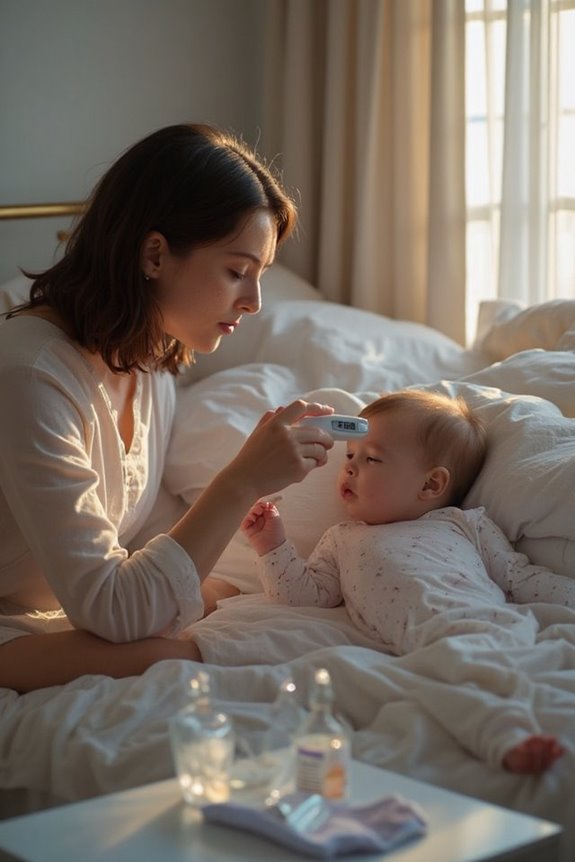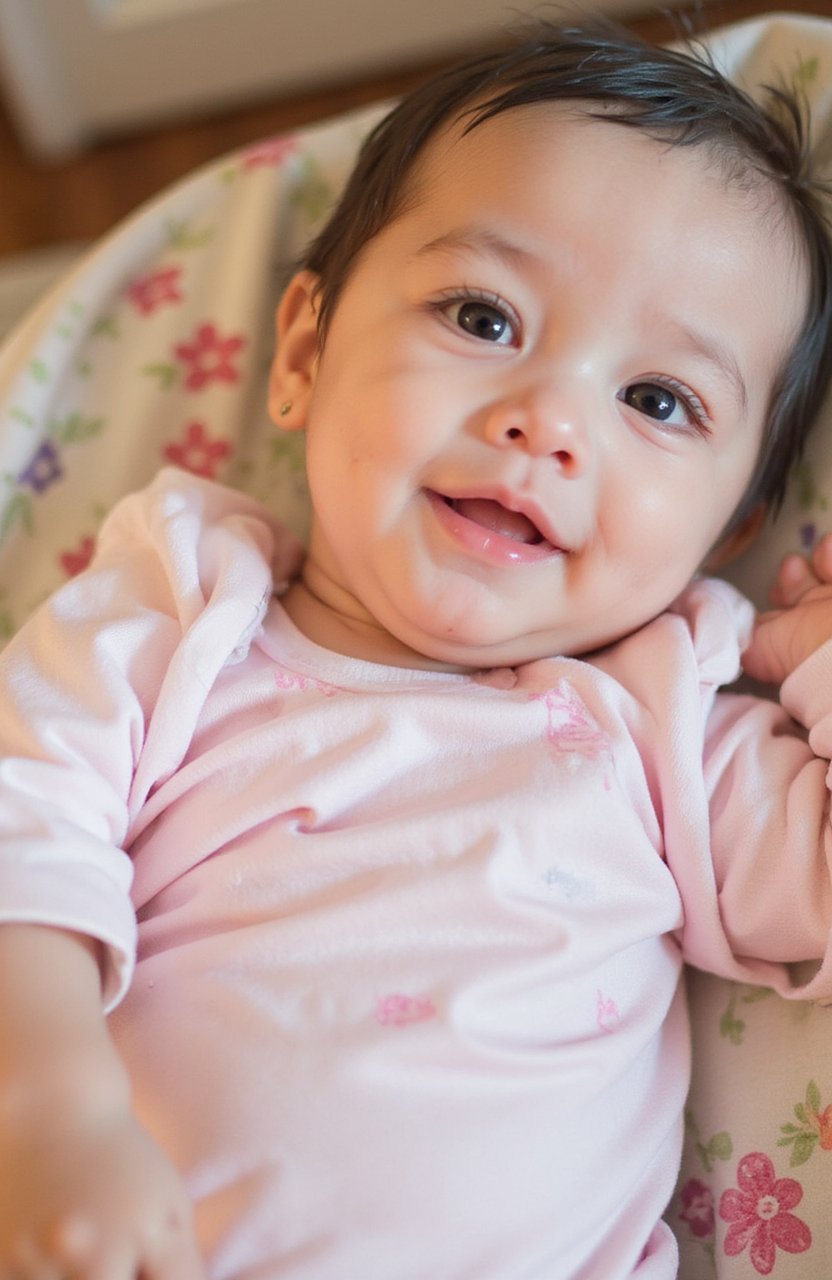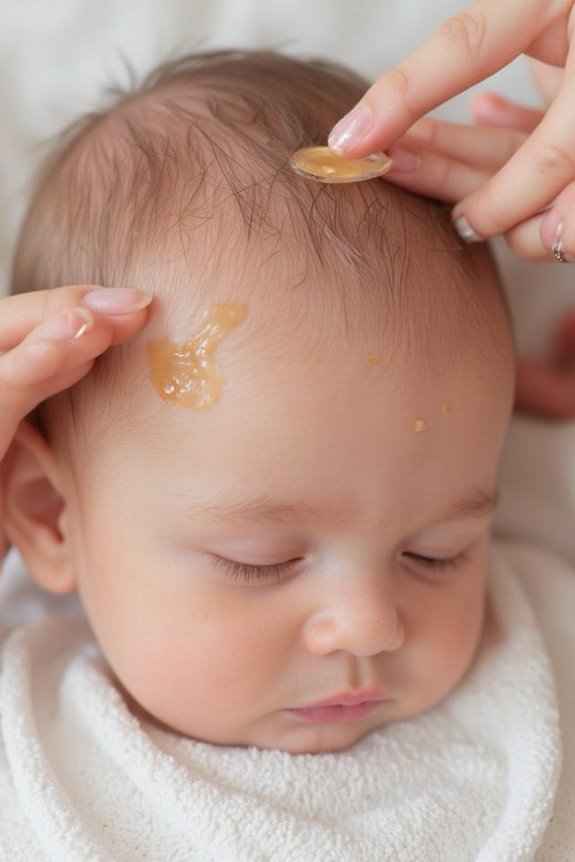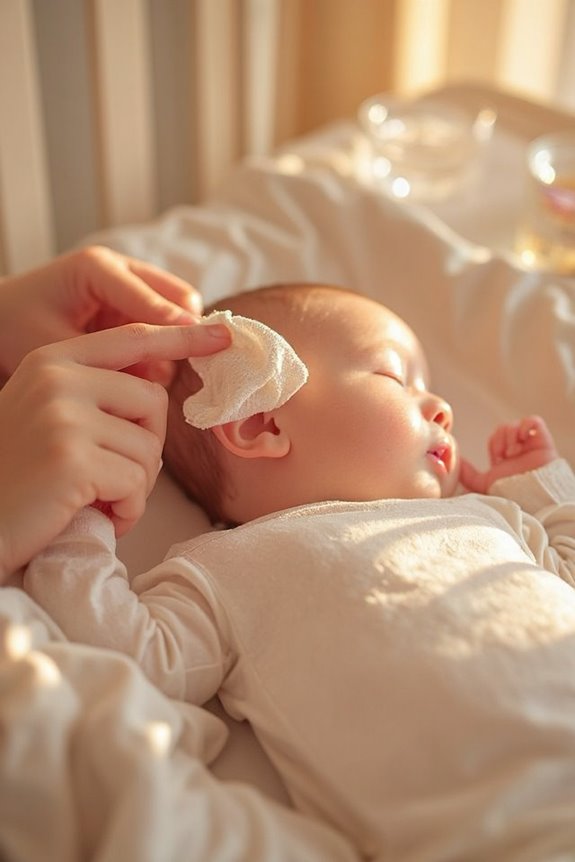A fever in your baby (100.4°F/38°C or higher) is their body’s natural defense against infection. For infants under three months, any fever requires immediate medical attention. Most fevers result from viral infections, though bacterial infections can also be culprits. At home, dress your baby lightly, offer frequent fluids, and monitor for wet diapers. Medications like acetaminophen may help, but proper dosing is essential. The following information will help you distinguish between normal fevers and true emergencies.
Key Takeaways
- Fever (100.4°F/38°C or higher) in babies under three months requires immediate medical attention regardless of other symptoms.
- Viral infections are the most common cause of baby fevers, while bacterial infections require different treatment approaches.
- Dress babies in light clothing, offer frequent fluids, and maintain comfortable room temperature to manage fever at home.
- Acetaminophen is safe for infants under 6 months, while ibuprofen should only be used for babies older than 6 months.
- Purple spots on skin, difficulty breathing, extreme lethargy, or temperatures above 104°F are emergency signs requiring urgent care.
What Constitutes a Fever in Infants and Toddlers
When your baby feels unusually warm, you’re likely dealing with a fever, which is typically defined as a body temperature of 100.4°F (38°C) or higher. Understanding fever symptoms in babies is essential for proper care.
Temperature measurement methods vary in accuracy:
- Rectal thermometers (most accurate for infants under three months)
- Oral thermometers (for older children who can cooperate)
- Under-arm (axillary) readings (less accurate but non-invasive)
- Ear or forehead thermometers (convenient but may be less reliable)
I want to emphasize that age matters greatly. For babies under three months, any fever requires immediate medical attention due to their immature immune systems. For toddlers, temperatures above 101.2°F (38.4°C) are considered fevers, but usually aren’t as urgent unless accompanied by other concerning symptoms.
Common Causes of Baby Fevers
Although fever itself isn’t an illness, it’s your baby’s body’s natural defense mechanism against infection. Most commonly, viral infections like colds and flu trigger fevers in babies. Bacterial infections, particularly urinary tract infections in girls, can cause silent fevers.
Respiratory infections and gastroenteritis often lead to acute fevers, while middle ear infections are another frequent culprit. Your baby may develop a fever within 24 hours after vaccinations—this is a normal vaccination response indicating the immune system is working.
Be aware that overheating causes can mimic fever, especially if your baby is overdressed during hot weather. Despite popular belief, research debunks teething misconceptions—teething doesn’t cause fevers.
Most importantly, fever in newborns under 3 months may indicate serious conditions requiring immediate medical attention.
When a Fever Signals an Emergency
Recognizing emergency fever situations in your baby can save precious time when every minute counts. I want you to know the critical emergency signs that require immediate medical attention:
- Fever in babies under 12 weeks old
- Temperature above 104°F (40°C)
- Purple spots on the skin that don’t whiten when pressed
- Difficulty breathing or swallowing
- Seizures or stiff neck
- Extreme lethargy or unresponsiveness
Severe fever symptoms like persistent vomiting, refusal to drink, or a swollen soft spot on the head are also urgent concerns. If your baby has a compromised immune system or shows signs of dehydration (no urine for 8+ hours, no tears), don’t wait to seek help. These indicators often signal serious underlying conditions that require professional evaluation immediately.
Managing Your Baby’s Fever at Home

Most fever cases in babies older than 3 months can be safely managed at home with proper care and attention. When my daughter had her first fever, I learned some essential strategies that helped us both get through it.
Comfort Measures:
- Dress your baby in light clothing to prevent overheating
- Use lukewarm (not cold) water for sponge baths
- Keep room temperature comfortable with good air circulation
- Allow plenty of rest in a quiet environment
Hydration Tips:
- Offer breast milk or formula more frequently
- Monitor for wet diapers (at least 4-6 daily)
- Watch for signs of dehydration like dry mouth or absence of tears
Remember to track your baby’s temperature regularly and avoid bundling them in blankets, even if they have chills. Proper hydration is vital for recovery.
Medications and Dosing Guidelines for Infant Fevers
While home care methods can help manage your baby’s fever, you’ll sometimes need medication for additional relief. Understanding proper medication types and dosing accuracy is essential for your infant’s safety.
For babies under 6 months, acetaminophen (Tylenol) is the only recommended option. Ibuprofen (Advil, Motrin) should only be used for babies older than 6 months. Never give aspirin to children due to the risk of Reye’s syndrome.
Always follow these guidelines:
- Use weight-based dosing for accuracy
- Measure doses precisely with the provided dropper
- Follow recommended time intervals (4-6 hours for acetaminophen, 6-8 hours for ibuprofen)
- Consult your pediatrician before giving any medication to infants under 3 months
Store all medications out of children’s reach to prevent accidental ingestion.
Preventing Infections That Lead to Fevers
Prevention of infections stands as your first line of defense against fevers in your baby. The most effective strategies include:
- Vaccination importance: Follow your pediatrician’s recommended immunization schedule to protect against common childhood illnesses that cause fevers.
- Hygiene practices: Wash your hands thoroughly before handling your baby, and guarantee visitors do the same.
- Breastfeed when possible: Breast milk contains antibodies that help your baby fight infections.
- Limit exposure: During cold and flu season, minimize trips to crowded places.
- Maintain clean environments: Ensure proper ventilation and regular cleaning of your home.
I’ve found that creating a consistent routine around these preventive measures greatly reduces the frequency of febrile illnesses in infants, particularly during their vulnerable first year.
Debunking Common Fever Myths for New Parents
Even with the best prevention efforts, your baby will likely experience a fever at some point. As a pediatrician, I’ve witnessed significant parental anxiety stemming from fever misconceptions.
Let me clear up some common myths:
• Myth: Fever itself is dangerous
Fact: Fever is actually your baby’s natural immune response
• Myth: Higher fever means more serious illness
Fact: The height of fever doesn’t necessarily indicate severity
• Myth: Fever causes brain damage
Fact: Normal fevers don’t cause brain damage
• Myth: All fevers need medication
Fact: Sometimes it’s appropriate to let a fever run its course
Frequently Asked Questions
Can Babies Develop Immunity After Having Fevers?
Yes, I believe your baby’s immune system can develop with each fever response. Fever is a sign that their body is fighting infection, which contributes to their immune development and strengthens future defenses.
How Accurate Are Different Types of Thermometers for Babies?
Like a master chef needs precise measurements, I rely on rectal thermometers for their gold-standard reliability with babies under 6 months. Oral thermometers offer less accuracy, while ear thermometers work well for older infants.
Do Babies Need Extra Clothing During a Fever?
No, I’d advise against extra clothing during your baby’s fever. For proper fever management, use fewer clothing layers instead. Lightweight cotton and sometimes just a diaper helps prevent overheating while keeping them comfortable.
Can Teething Gels Help With Fever-Related Discomfort?
According to the FDA, I don’t recommend teething gels for fever-related discomfort. They’re ineffective for managing fever, one of the possible teething symptoms. Instead, consult your pediatrician about proper fever management with appropriate medications like acetaminophen.
Do Breastfed Babies Experience Fewer or Less Severe Fevers?
Yes, breastfed babies typically experience fewer and less severe fevers. I’ve seen research showing breastfeeding benefits include enhanced immunity that can reduce fever duration and frequency compared to formula-fed infants.





